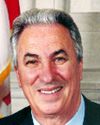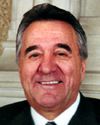moved that Bill C-244, an act to provide for the taking of samples of blood for the benefit of persons administering and enforcing the law and good Samaritans and to amend the criminal code, be read the second time and referred to a committee.
Mr. Speaker, it is a pleasure to speak today to Bill C-244, the blood samples act, also known, for reasons I will get into shortly, as the good Samaritan's act.
I will start by telling the ancient story of the good Samaritan. A certain man was going down from Jerusalem to Jericho and he fell among robbers. They stripped him and beat him and went off leaving him half dead. And by chance a certain priest was going down on that road, and when he saw him, he passed by on the other side. and likewise a Levite also, when he came to the place and saw him, passed by on the other side.
But a certain Samaritan, who was on a journey, came upon him. When he saw him, he felt compassion, and came to him, and bandaged up his wounds, pouring oil and wine on them, and he put him on his own donkey, and brought him to an inn, and took care of him.
And on the next day he took out two silver coins and gave them to the innkeeper and said “Take care of him, and whatever more you spend, when I return, I will repay you”.
That is the story of the good Samaritan. It is a story of helping the less fortunate, helping society and doing what is right even if you are the only person prepared to follow through on your own beliefs.
A constituent of mine acted as a good Samaritan but unfortunately paid a price for his actions. He now runs the risk of contracting HIV.
His father contacted me to tell of the heroic actions of his teenage son. The young man, whom I will call Tim, was working at a retail store when another man grabbed some items and sprinted away on foot. Rather than just shrugging his shoulders and letting him run away, Tim chased after the thief and tackled and held him until the police arrived.
Unfortunately for Tim, the shoplifter cut himself in the action and a good deal of blood was spilt on Tim as he made a citizen's arrest. It turned out that the thief was also an intravenous drug user, well known to the authorities and a high risk of carrying communicable diseases. Some of the virus may have got into Tim's young body.
I am sure Tim did not wait to see whether or not this person had a communicable disease before he did the right thing and stopped him from stealing. I think he is just wired up that way and that he was taught that way. He was brought up in a home where one does the right thing because it is the right thing to do, not because we weigh the risk to our own person.
It was a tragedy when the police had to break the news to Tim that the thief had refused to give him a blood sample. They told Tim that the law makes it impossible to take a sample unless the person is willing to give it up.
Consequently, Tim was forced into a lengthy, extensive and expensive program of preventive drug therapy just in case the virus was present. The therapy is not 100% effective, of course, but more importantly Tim had to go through this therapy because he did not know one way or the other whether a communicable disease was present.
If Tim could have known what diseases, if any, the shoplifter had, he could have made a more informed decision about his own health and the care that he should have sought. He could have decided whether to continue to take the medical treatment, because the drug therapy carries with it serious adverse effects. Most of all, Tim would have had greater peace of mind and more emotional strength to face the future if he had known what his chances were of contracting a communicable disease.
Unfortunately, Tim's example is not isolated. Let me read a story of Isobel Anderson, an Ottawa police constable who is in the gallery today. We can read her full story in an article by Anna Nicolle in the November 15, 1999 edition of the Ottawa Citizen . I will read a little of that article:
Isobel Anderson's nightmarish experience began when she arrested a man for armed robbery in October 1997. While searching for weapons, she reached into his pocket and felt a stab of pain. She pulled her hand out to find a bloody needle stuck in her palm. “My first thought, was God, I have AIDS,” recalls Constable Anderson, a mother of three.
She then went on to describe the emotional trauma she had as a young mother on her own. As she feared, doctors told her the needle may have infected her with HIV. She was advised that if she started treatment with the anti-HIV medication AZT within hours of being jabbed she might not contract the virus.
Then she learned that the robbery suspect refused to take the HIV test and could not be compelled by law to give a blood sample. Hours later the man agreed to be tested because he was hungry. He said “If you give me a hamburger, I will give you a blood sample”. In other words, Ms. Anderson's life, which was hanging in the balance, was only traded off for a blood sample and a hamburger. It should not have to be that way. The law should specifically state that Ms. Anderson had the right to know whether or not that person had a communicable disease.
Both HIV and hepatitis C can take a long time to develop or incubate. Ms. Anderson continued taking AZT for three days until her initial HIV test results came back negative. Then after consulting with her doctor, she decided not to continue using the drugs. She said that the side effects of her treatment were life changing. The chemotherapy side effects, which involved hives, hair loss and chronic pain, lasted for weeks, to the point where she could not get up out of her own chair.
Today, thankfully, Isobel Anderson is both HIV and hepatitis C negative. It is sad when, under our present legal system, those who help others become helpless, those who sacrifice become sacrificed and the heroes become victims.
That is why Bill C-244 is for people like Tim and Isobel. It is also for the literally thousands of other Canadians just like them: the paramedics, the police officers, the ambulance workers, the doctors, the nurses, the firefighters, the dentists, the dental hygienists, the security guards and volunteers, the different health workers and attendants, the ski patrol, which was at the news conference this morning, all of the emergency workers and thousands of people like Tim who do a good deed just to help people out. It is for those who give the most to help our society but receive little back in return when they are the ones needing help. That is what this bill is about.
How would this bill help Tim, Isobel and the thousands of people I mentioned in the future? In a nutshell, Bill C-244 enables a judge to order the taking of a blood sample from any person who is either accidentally or deliberately contaminated a good Samaritan, health care professional, emergency professional or security professional while in the course of duty. The person's blood would be tested for HIV, hepatitis B and hepatitis C. The blood test analysis would only be shared with the individual from whom the blood sample was taken, the contaminated person, a qualified medical practitioner conducting the test and the police officer responsible for executing the warrant. Only those four people would know the results of those three tests. The blood test analysis would be used for medical treatment only.
What would Bill C-244 mean for people like Tim and Isobel? Some people say that it would not mean that much because people might want to take the treatment anyway because relying on the test results of an alleged assailant could provide false assurances.
However, I would ask the following question of everyone in the House. What if it were one of the members who had a high risk exposure to someone else's blood or other bodily fluids? What if it were you, Mr. Speaker? Would you not want to know just what it was that you had been exposed to? Would you not want to know what your chances were of contracting a communicable disease? I would say yes, and I am almost certain that everyone else would say yes. Why is this? I think it is because there are three assurances by getting a blood sample from an alleged assailant's blood.
I will talk about the three true assurances that the blood test results would give. First, knowing whether the source person has HIV, hepatitis B or hepatitis C assures the victim of a better decision regarding his or her own health. The victim has to decide whether to take a very intrusive chemotherapy program to prevent the advance of the disease, and it would help the victim to make that decision wisely because it is a difficult and very traumatic decision to make.
In Isobel's case and in many other cases, once victims or patients discover that the assailant or injured person has tested negative to these diseases, they terminated the treatment. It gives them a better chance of making a good medical decision in their own lives.
From 1996 to 1998, the Toronto hospital assessed 30 possible sharps-related exposures to HIV. In other words, they were mostly pin pricks from needles where there was possible contamination. Here is one quotation from its study, after counselling of these 30 people, “5 persons chose not to take treatment; 8 persons started chemoprophylaxis but discontinued when the source patient's results were negative”. They changed their minds based on that test result. “Rapid HIV testing helped to reduce the duration of the treatment. The remaining 17 persons planned to take one month of medication; 9 of the 17 completed the medications”, and so on.
The study stated that the side effects experienced by all persons on these medications included nausea, vomiting, headaches, diarrhea and insomnia. It is a very traumatic chemotherapy prevention program.
The other serious side effects involve potential harm to reproductive capacity, hair loss, numbness, tingling in the hands or feet, a decrease in the number of white blood cells, anemia, malaise, coughing, abdominal pain, kidney stones and a higher risk of contracting diabetes. All these are side effects from a preventive chemotherapy program.
As we can see, taking these drugs to fight HIV is not like a doctor saying take two aspirins and see me in the morning. The side effects are serious. Taking these drugs is not entered into lightly. I think everyone would want to know whether or not the person who contaminated them had a serious communicable disease. Clearly it is far better for one's health to stop the treatment than to continue taking the medication if one knows about it. At least that is what many people have decided in these test cases.
The second true assurance of testing perpetrators' or people's blood is that they are also assured of treatment if carrying a disease unknowingly. Again that would be their decision. Imagine people who perhaps are intravenous drug users and have not bothered to get a blood test. If this situation came upon them, the blood test results would be shared with them. They might want to say that one should know if one has hepatitis B and have some treatment for it, or the side effects or consequences will be serious. It would help such a person as well.
The third true assurance of testing is that whether negative or positive it provides a greater peace of mind to the good Samaritan, emergency or health professional. Therefore I would argue there are good reasons to take this test and to proceed with it. Testing perpetrators or injured people for communicable diseases will not provide false assurances to the victims and patients. It will provide true assurances and true alternatives for them as they decide what medical treatment they should be taking.
Some people are focused on the negative parts of the bill. They are concerned about charter protection of rights, security of the person and so on. Those are valid concerns that I have tried to address in the bill by making it very difficult but not impossible to get a blood sample from someone who is at high risk of passing on a communicable disease. It is a fair and proper balance between the charter rights of the sick, injured and perpetrators of crime and the charter rights of those who are in service to help others.
Under the present system emergency and law enforcement professionals and good Samaritans have no right to the security of their person. If these individuals have a high risk exposure to a stranger's blood they have no means to determine the likelihood of whether or not they have contracted a disease.
They must anxiously await the incubation periods for HIV, hepatitis C and hepatitis B. In the meantime they can choose to undergo medical treatments with severe health side effects, treatments they probably would not take if they knew that the blood to which they had been exposed had tested negative for HIV.
This situation produces severe mental and physical duress and I believe violates a person's rights. People should have a right to know what virus may have entered their bodies. Bill C-244 would correct this rights imbalance. It does not swing the rights all the way over one way or the other. It tries to find that balance between the rights of a perpetrator of a crime to privacy and security of the person, but it also protects those who are trying to do good in society.
Bill C-244 protects people's privacy in four ways. A judge is the only individual who can order that a blood sample be taken. It is not a police officer and it is not a paramedic. The blood samples can only be analysed for hepatitis C, hepatitis B and HIV. Blood sample results are to be used only for medical treatment purposes and for no other reason. The only people who may have access to the results of the blood test are a peace officer, the medical practitioner, the applicant and the person from whom the sample of blood was taken.
In summary, the blood samples act is about fairness. Presently people do not have the right to know what may have infected their bodies from a third person, and Bill C-244 would correct this.
Second, the blood samples act is about balancing rights. Under the present system only the perpetrator of a crime or the injured or sick person has the right to the security of the person. Bill C-244 would correct this negative situation and make it a balance of rights between both parties.
Third, the blood samples act is about helping everyone involved in this very difficult situation. It is about health care, security professionals of all kinds and good Samaritans. It would also assist the crime suspect carrying a serious virus unknowingly. It is about positive change to our legal system that would provide fairness, a better balance between different rights and assistance for those who are in the service of others.
Tim, Isobel and thousands of other professionals need this bill, this kind of protection, as they go about their work. In the original story of the good Samaritan the only reward was that his name was enshrined in the Bible and he has gone on to become an example of a good Samaritan. Good Samaritan is still in our language today as an example of people who go out of their way to help others when they could have just passed by.
The bill recognizes that those who help the needy in society, health care professionals, and what we commonly call good Samaritans should have the assurance of knowing that when they go about their good work, when they do a good deed, when they help the needy, they will not be penalized and restricted by their knowledge. I ask for support from all sides of the House for the bill.
























































































